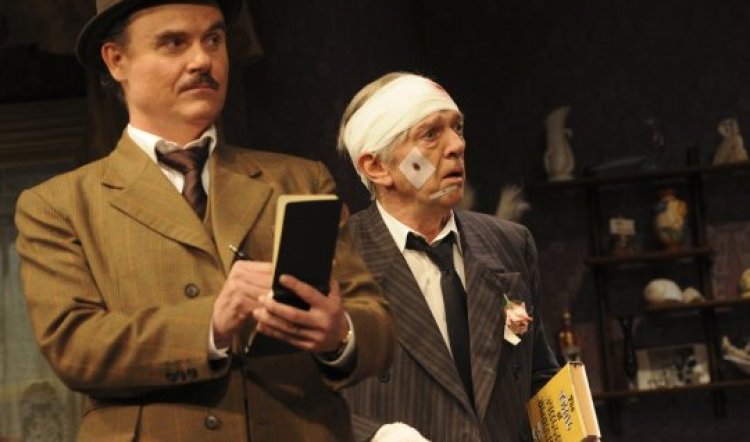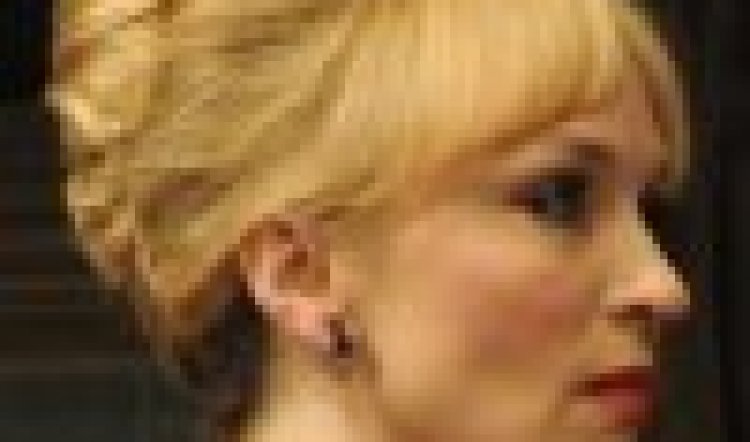
LOOT
LOOT, Sydney Theatre Company at the Drama Theatre, Sydney Opera House; September 17-October 23, 2011. Photos: Darren Gilshenan and William Zappa. Right: Caroline Craig, by Heidrun Lohr
When the STC’s 2011 season was announced, back in the mists of late 2010, my heart began to sink when “Joe Orton’s Loot” appeared on the list. Of all theatrical undertakings, farce is (arguably) the most rewarding and (inarguably) the most difficult to realize. If the director isn’t up to the task – and few are – the enterprise is already dead in the water and nothing can bring it to life.
Happily, the name listed as director for this production was Richard Cottrell, so my heart stopped sinking and instead began to soar. (This is the same heart, by the way, that earlier this year, during the opening performance of the STC’s Zebra, began an adventure unattractively known as “acute myocardial infarction”. So anyone who believes theatre isn’t deeply affecting should think again.)
The reason for optimism – Richard Cottrell – most recently gave us the marvelous Ying Tong: a Walk with the Goons and the equally brilliant Travesties. He is a master of comedy and, even more rare, a master of farce. It also means that, in the nicest possible way, he is a master of actors. If actors don’t trust their director in a play such as Loot they will be unable to do it, either individually or collectively, no matter how good each actor might be. Cottrell is quite clearly trusted with their theatrical lives by this cast.
Caroline Craig demonstrated it the moment she walked on stage in the opening scene and commanded it. She’s one of the juniors in the cast and not that experienced – although her still-slight CV is a list of fine performances – and to date she’s not been charged with anything as complex and demanding as the homicidal temptress, Nurse Fay. She is tremendous.
Robin Goldsworthy as Hal McLeavy, Mod son of the sheet-wrapped corpse at the centre of the pitch black comedy of her funeral day is another up-and-comer who shines here; while Josh McConville, as Hal’s polymorphous perverse mate Dennis is already an up-and-arrived, yet his timing and discipline in the role of the undertaker-bank robber is on another level again.
That there are levels upon levels to be explored and achieved by actors is dazzlingly obvious in the two “senior” cast members: William Zappa and Darren Gilshenan. On the night both spoke of how much they’ve learned from working with their director – and each is already one of the finest performers currently working on Australia’s stages.
As the grieving and decent widower McLeavy, Zappa is the bumbling, well meaning and perfect foil for the unlikely menace of Gilshenan’s brutal, cerebrally challenged, yet all-knowing detective Truscott. These two delighted audiences a while back when they appeared together in another difficult-brilliant comedy The Government Inspector; John Bell, their director on that occasion, was in the opening night audience and is one of very few on a par with Cottrell when it comes to the laughter business.
The play, first written by Orton when he was 32, shocked rigid the society he so mercilessly lampooned. While the hypocrisy of (immigrant Irish) Catholics and their Church are the superficially obvious target, it’s his skewering of Scotland Yard that was truly anarchic. The ghastly Truscott – fitting up suspects, beating up another, happy to take a bribe as well as ridiculously pompous and stupid – was an even more outrageous idea for the audiences of 1966. These were people who, while inhabiting “Swinging London” and nodding along to The Beatles, were still part of the fantasy of kindly, honourable Dixon of Dock Green. That BBC TV series regularly glued 13 million family viewers to their tellies early on Saturday evenings and did so for 20 years (1955-1976). Even Z Cars – created to counter the PC George Dixon fairy tale and be modern and realistic – never dreamt of featuring a character like Truscott. Moreover, depicting a crooked cop or a crook coming out on top was simply not permitted. Cops rooled and did so with the purest motives and methods.
The hilarious but frightening Inspector Truscott then, is the key to the scandalous delight that was (and is) Loot. He goes a long towards explaining why Orton so despised polite British society and the genteel cant to which many still clung. (Realized by Victoria Lamb as the McLeavys’ lounge room with tongue-in-cheek hyper-realism – Tretchikoff’s Green Girl hangs where the Virgin’s bleeding heart would have presided back in old Ireland.) As a wildly promiscuous gay who had experienced first hand the reality of police arrest and treatment, Orton wouldn’t live to fully benefit from the social reforms of “Pipe Smoker of the Year” Harold Wilson’s Labour government, which included not only the decriminalising of sex between men in private but also the abolition of the death penalty and theatre censorship.
Meanwhile, however, even as Orton’s lower middle class cast merrily swapped a corpse for bundles of bank notes, poked fun at the Pope and dabbled in a little light corruption, the ruling class had been engaged in the farce of such adventures as “The Profumo Affair”. The real life orgy of vice, lies, drugs, royalty, spies and Parliament that filled the newspapers of 1963 fueled Orton’s creative anger. It had first been targeted at artistically defacing library books, then produced the play that, after much angst and rewrites, finally became a masterpiece of political and social farce – and marvelous language.
Richard Cottrell’s production is underscored by his understanding of that language and the importance of the actors delivering it as if it were as ordinary as a shopping list. And also that they perform their roles without the usual desperate search for “the laugh” – and instead trust the material and know that the straighter they play it, the funnier it will be. The result is an evening of that rare and wonderful thing: full throated, raucous laughter. The audience on opening night was swept up in exuberant delight and – tellingly – wouldn’t go home afterwards, staying instead to savour the pleasure of the shared experience in animated conversation and light hearts.
My somewhat battered heart sang with the thrill of out and out laughter and the intelligence of this delicious production. Can’t wait to go back for more. Laughter, as the Reader’s Digest has always so wisely noted, is definitely the best medicine.




